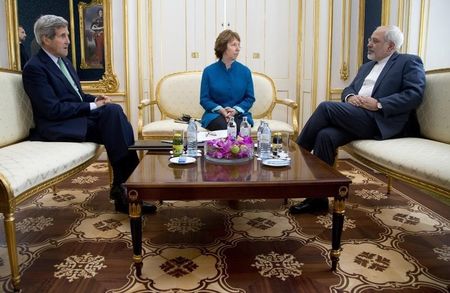DUBAI (Reuters) - Iran sees no alternative to a diplomatic settlement with six world powers on its nuclear programme and believes both sides are resolved to reach a deal by a self-imposed Nov. 24 deadline, its deputy foreign minister said on Saturday.
Mohammad Javad Zarif will hold talks with U.S. Secretary of State John Kerry and senior European Union envoy Catherine Ashton in Oman on Sunday to try to narrow big gaps before full negotiations formally resume in Vienna on Nov. 18.
The decade-long standoff over Western suspicions that Iran has covertly sought to develop the means to build nuclear weapons - something it denies - has raised the risk of a wider war in the turbulent Middle East.
"No middle solutions exist and all our thoughts are focused on how to reach a settlement," Abbas Araghchi, the deputy foreign minister and Iran's chief negotiator, told the state news agency IRNA.
"No one wants to return to the way things were before the Geneva Agreement. That would be too risky a scenario," he said, referring to the preliminary accord reached a year ago under which Iran has curbed some sensitive nuclear activity in exchange for limited relief from international sanctions.
"Both sides are aware of this, which is why I think a deal is within reach. We are serious and I can see the same resolve on the other side," Araghchi was quoted by IRNA as saying.
The stickiest unresolved issues are Iran's overall uranium enrichment capacity, the length of any long-term agreement and the pace at which international sanctions would be phased out, according to Western diplomats involved in the negotiations.
Kerry said on Wednesday the negotiations would get more difficult if the Nov. 24 deadline were missed, and the powers were not - for now - weighing any extension to the talks.
His remarks seemed aimed in part at raising the pressure on Tehran to agree to the deal, which would include tougher U.N. inspections to verify Iran is complying with its provisions.

Iran says it is enriching uranium solely for a future network of civilian nuclear power stations and to yield isotopes for medical treatments.
(Reporting by Mehrdad Balali; Editing by Mark Heinrich)
